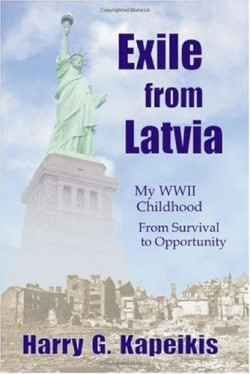Exile From Latvia
When Harry Kapeikis’s family left Latvia in 1944 they thought they would return soon and took little with them. Little did the Kapeikis family know that the Germans would not sweep in and defeat the Russians and that their journey would eventually take them to America. Kapeikis was just nine years old when the displacement began.
His account sheds light on the ambivalence that some World War II refugees felt about leaving Europe when they got news that they would be relocated. The fear of the unknown is great even for those who are living in reduced circumstances. He describes it as “Good news though bittersweet news mixing anticipation with anxiety certainty with uncertainty.”
The author was able to rely on his mother’s detailed diary copies of his uncle’s magazine for displaced Latvians and his own diary. The photos scattered throughout the book combined with the author’s memories make this a lively child’s-eye account of displacement and growing up in the midst of war. He has a remarkable amount of documentation at his disposal much more than most other refugees.
About his first encounter with American soldiers Kapeikis writes “The most amusing and puzzling thing I learned was that Americans didn’t speak American. They spoke English. I wondered how did that come about?”
“Children in war zones tend to mature quickly” Kapeikis notes. His account exemplifies this yet still shows the marks of childhood. He and his friends go fishing squabble over girls and get into mischief. When Harry and others act out and mirror the fighting all around him he is punished but also counseled to channel his energies in another direction: “My teachers turned the fiasco I had created into a life changing learning experience.”
Indeed the author does go on to fulfill his desire to be a “creative kind and helpful person” as a Lutheran minister and a soldier in the U.S. Army. He has now retired and keeps in touch with some of his friends from his formative years. Clearly none of his experiences being displaced from his homeland during World War II were easy but as this book demonstrates he managed to keep a hopeful spirit.
Disclosure: This article is not an endorsement, but a review. The publisher of this book provided free copies of the book and paid a small fee to have their book reviewed by a professional reviewer. Foreword Reviews and Clarion Reviews make no guarantee that the publisher will receive a positive review. Foreword Magazine, Inc. is disclosing this in accordance with the Federal Trade Commission’s 16 CFR, Part 255.

